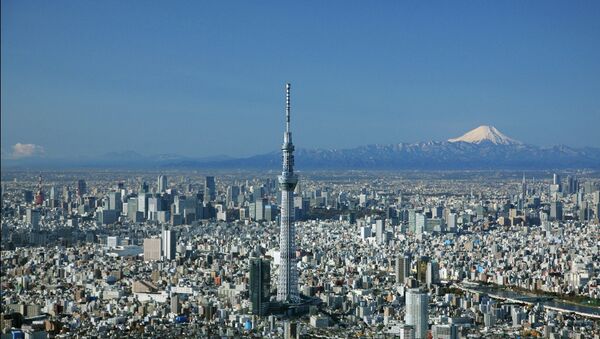MOSCOW, November 18 (Sputnik) — Japan’s sudden recession has exacerbated negative trends on the Asian-Pacific markets, as South Korea’s financial volatility is peaking and China’s housing prices are down, while investors are anticipating further stimulus action from Japan’s PM Abe.
Tokyo’s markets edged up at the opening Tuesday, as traders expect the government to postpone the second income tax increase and introduce new stimulus measures after the data showed a technical recession yesterday. The Nikkei index added 1.9%, pushing Korea’s Kospi index up 1.2%, indicating investors’ trust in ‘Abenomics’ is still in place.
"The recession read now squarely asks the question: is Abenomics a failure? Is it even able to influence the structural issues facing the Japanese economy? The jury remains divided," Evan Lucas of IG Markets said as quoted by Bloomberg. "However the response to the GDP figures was obvious — when in doubt, spend your way out."
There have been hints from the government that further monetary injections may soon follow, and a new tax hike, previously expected in October next year, will be postponed indefinitely.
Japan’s recession news has shaded positive developments in China, where yesterday, a stock exchange connection was opened between Hong Kong and Shanghai, causing an influx of money into the mainland. However, yesterday both Shanghai Composite and Hang Seng closed in the red and continued their fall today, having shed 0.6% and 0.7%, respectively. Today, international investors carried on buying Shanghai assets, purchasing 3.4 bln ($560 mln) renminbi worth of stocks so far as compared to yesterday’s buyout of 13 bln renminbi ($2.12 bn).
Apart from the spillover effect of Japan’s economic contraction, China’s domestic negative trends have add to investors’ concern. New home prices are falling suddenly for the first time after a two years’ rally. Real estate prices in Beijing slid 1.3% in October year-on-year, compared to an annualized growth of 14.7% this January. It is yet unknown whether this is an indication of the real estate bubble burst, or just an effect of the economic slowdown.
"The risk is the intersection of a non-bank credit boom going into housing," Paul Gruenwald of S&P said as quoted by Sydney Morning Herald. In his opinion, more risks are now coming from the mainland real estate market and "prices are falling in 69 of 70 cities across China – everything is softening." According to S&P projections, China will be able to “muddle through” the possible real estate slump with direct governmental intervention.
The property bubble burst is the greatest risk to China’s economy at this point, as the real estate sector contributes over 15% to the mainland economy. Home prices in China have been falling during last four days.
"It's a correction. It's definitely not a crash,” Alan Jin of Mizuho Securities optimistically said as quoted by CNBC. In his view, the demand for property is still good in China.
Japan’s recession news has also rocked South Korean markets. Yesterday Tokyo took some urgent stimulus measures, buying 38 bln ($326 mln) yen in exchange-traded funds, as well as 1.2 bln ($10.2 mln) yen in Japanese real-estate investment trusts, boosting financial volatility in Asia-Pacific. And Korean Kospi, having already been very unstable, turned feverish.
Price swings in South Korea’s Kospi boosted trading volumes by 56% and at this point there are more speculative earnings. The market is heating slowly, however, the situation is far from being a bubble.
“Increased volatility and trading volume helped brokers to earn more commissions,” Lee Chul Ho of Korea Investment & Securities Co said as quoted by Bloomberg. “Whether investors win or lose, brokers get money as long as trading incurs.”
South Korea’s economy is slowing amid a decreased international demand for manufactured exports, and the Bank of Korea (BOK) has decreased the 2015 growth forecast to 3.9% from 4%. However, as trade liberalization in Asia-Pacific is widening with multiple bilateral FTAs (including between South Korea and China) and the ambitious TPP, Korea’s growth may soon accelerate.
Meanwhile, Korea’s financial sector will be growing fast in the short-term thanks to Japan’s turbulence and further easing.
“The overall low-rate condition will draw people into the capital market, which will help earnings for the brokers,” Han Jeong Tae of Hana Daetoo Securities Co told Bloomberg. BOK easing will continue, Han added, which will also boost manufacturing forecasts and overall performance.



